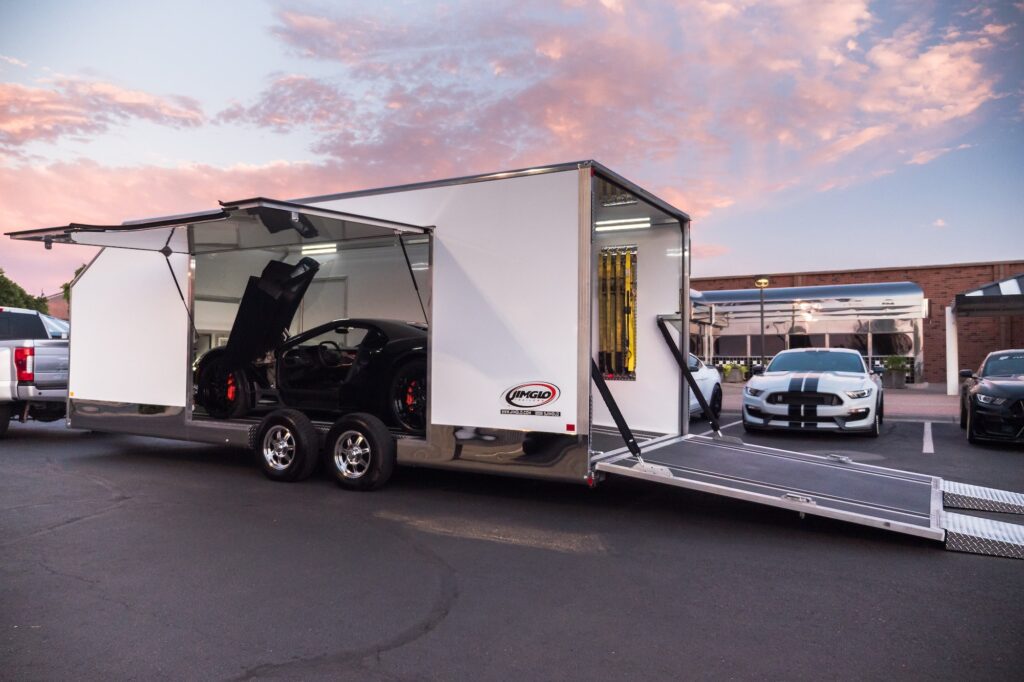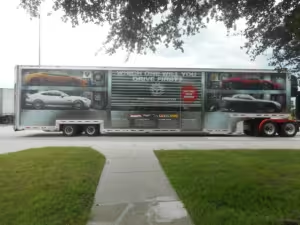
Enclosed car shipping is a premium service designed for vehicle owners who prioritize the protection and security of their automobiles during transport. Whether you’re moving classic, or luxury car, or simply want the peace of mind that your vehicle will arrive in pristine condition, enclosed car shipping offers unparalleled benefits over traditional open transport.
Summary
What is Enclosed Car Shipping?
Enclosed car shipping is a specialized transport service designed to offer maximum protection for vehicles during transit. Unlike open car transport, where vehicles are exposed to the elements and potential road hazards, enclosed car shipping involves placing vehicles inside a fully enclosed trailer. This method ensures that the vehicle is shielded from weather conditions, road debris, and prying eyes, making it the safest option available.
A. Definition and Overview
Enclosed car shipping involves transporting a vehicle in a trailer that is completely enclosed on all sides, typically made of metal, with either soft or hard sides. These trailers are designed to protect vehicles from external factors such as rain, snow, dust, and dirt. Enclosed shipping is often used for high-value, classic, or luxury vehicles where any form of damage could significantly decrease their value or require expensive repairs.
The trailers used in enclosed car shipping come equipped with advanced features like hydraulic lift gates, which ensure that low-clearance vehicles can be loaded and unloaded without risk of damage. Additionally, enclosed trailers often have climate control and secure tie-down systems, further enhancing the safety and security of the vehicle.
B. Types of Enclosed Carriers
Enclosed car shipping offers various types of carriers, each suited to different needs:
- Soft-Sided Enclosed Carriers: These trailers have a sturdy frame with soft, canvas-like sides. While they offer good protection from weather and road debris, they might not be as secure as hard-sided carriers.
- Hard-Sided Enclosed Carriers: These are fully enclosed in metal or fiberglass, offering the highest level of protection. They are ideal for transporting high-value or delicate vehicles.
- Single-Car Enclosed Carriers: These carriers transport only one vehicle at a time, providing individualized attention and care. This option is perfect for extremely valuable or rare vehicles that require special handling.
- Multi-Car Enclosed Carriers: These carriers can hold multiple vehicles, usually between two to six, inside a single trailer. While still offering premium protection, this option is more cost-effective than single-car carriers.
Why Choose Enclosed Car Shipping?
Choosing enclosed car shipping offers several significant advantages, particularly for vehicle owners who value the safety and preservation of their cars. This method of transport is specifically designed to minimize risks and provide peace of mind, making it the preferred choice for transporting high-value, delicate, or rare vehicles. Here’s why enclosed car shipping stands out:
A. Protection from External Elements
One of the primary reasons to choose enclosed car shipping is the protection it offers against external elements. Vehicles transported in open carriers are exposed to rain, snow, hail, and harsh sunlight, which can cause damage to the paint, bodywork, and internal components. Additionally, road debris like rocks, dust, and dirt can chip paint or crack windshields. Enclosed carriers completely shield vehicles from these hazards, ensuring that your car arrives in the same condition as when it was loaded.
B. Insurance and Liability Coverage
Insurance is another crucial factor that makes enclosed car shipping an attractive option. Many enclosed car shipping services come with higher levels of insurance coverage compared to open transport, reflecting the value of the vehicles typically transported in this manner. This enhanced coverage provides extra protection, ensuring that in the rare event of damage, the cost of repairs or replacement is adequately covered. For vehicle owners, this added layer of financial security is a compelling reason to opt for enclosed shipping.

Who Should Consider Enclosed Car Shipping?
Enclosed car shipping is not a one-size-fits-all solution; it’s a specialized service tailored for specific types of vehicles and transport scenarios. Understanding who benefits the most from this service can help you determine whether it’s the right choice for your needs. Below, we outline the key groups of vehicle owners who should strongly consider using enclosed car shipping.
A. Classic and Vintage Car Owners
Classic and vintage car owners are among the primary candidates for enclosed car shipping. These vehicles are often irreplaceable, with historical significance and sentimental value, making any potential damage devastating. The unique designs and materials used in older cars can be especially susceptible to the elements and road debris. Enclosed shipping provides the protection needed to preserve these vehicles’ integrity, ensuring they remain in pristine condition during transit. For example, a rare 1960s muscle car being transported to a car show across the country would be best served by the enclosed method to avoid any risk of damage.
B. Luxury and High-End Vehicle Owners
Luxury and high-end vehicles often come with hefty price tags and are typically crafted with precision, using delicate materials that require special care. Owners of such vehicles invest significantly in maintaining their appearance and performance, so it makes sense to choose a transport method that reflects this investment. Enclosed car shipping provides the enhanced security and privacy necessary to safeguard these valuable cars from prying eyes and potential theft. Whether it’s a Ferrari, Lamborghini, or a custom-built sports car, enclosed transport ensures that every detail is protected.
C. Owners Transporting Vehicles During Harsh Weather Conditions
Even if your car isn’t a classic or Luxury model, there are certain situations where enclosed shipping is advisable, such as transporting a vehicle during harsh weather conditions. Snowstorms, heavy rain, and extreme heat can all take a toll on a car’s exterior and interior. If you’re moving a car across regions with unpredictable weather, or during winter months when salt and grit on the roads can cause corrosion, enclosed car shipping provides a controlled environment that shields your vehicle from these potential dangers.
How to Prepare Your Car for Enclosed Shipping
A. Inspect and Document the Vehicle’s Condition
Before handing over your vehicle to the shipping company, it’s crucial to thoroughly inspect it. Start by cleaning your car inside and out, as dirt and dust can hide scratches, dents, and other imperfections. Once the car is clean, conduct a detailed inspection, noting any existing damage such as scratches, dents, paint chips, or other blemishes. Take clear, time-stamped photographs from multiple angles to document the vehicle’s condition. This documentation will be invaluable if there’s a need to file a claim for any damage that might occur during transport. Share this information with the shipping company and keep a copy for your records.
B. Ensure Proper Insurance Coverage
While enclosed car shipping offers excellent protection, it’s still wise to review your insurance coverage before shipping. Confirm that the shipping company’s insurance policy provides adequate coverage for your vehicle’s value. If you have concerns about the level of coverage, you may want to purchase additional insurance to cover any potential gaps. Understanding the insurance terms and knowing what is covered will give you peace of mind throughout the shipping process.

Cost Factors in Enclosed Car Shipping
A. Distance and Location
The distance between the pickup and delivery locations is one of the most significant factors affecting the cost of enclosed car shipping. Longer distances generally lead to higher costs due to increased fuel consumption and time required for transport. Additionally, the geographic location can impact pricing; shipping in remote or less accessible areas may incur additional fees. For example, transporting a vehicle from New York to Los Angeles will be more expensive than shipping within a single state due to the increased distance and logistical complexities.
B. Vehicle Type and Size
The type and size of the vehicle play a crucial role in determining shipping costs. Larger and heavier vehicles require more space and resources, which can increase the overall shipping fee. Additionally, high-value vehicles may attract higher premiums due to the extra care and specialized equipment needed for their transport. For instance, shipping a luxury SUV will generally cost more than shipping a standard sedan because of the additional space and weight considerations.
C. Seasonal Demand
Seasonal variations can also impact the cost of enclosed car shipping. During peak seasons, such as summer or holiday periods, demand for shipping services increases, which can drive up prices. Conversely, during off-peak times, shipping rates may be lower due to reduced demand. It’s beneficial to plan your shipping needs ahead of time and consider scheduling during less busy periods to potentially save on costs.
Case Study: Success Story of Enclosed Car Shipping
Transporting a Rare Classic Car
Background:
John, an avid car collector, owned a 1967 Shelby GT350, a rare classic car with significant historical value. John was preparing to showcase his Shelby at a prestigious classic car event on the other side of the country. Given the car’s rarity and value, John was particularly concerned about its safety during transport. He decided that enclosed car shipping was the best option to ensure that his prized possession arrived in pristine condition.
Challenges:
- Distance: The car needed to be transported from Miami, Florida, to San Francisco, California—a journey of over 2,500 miles.
- Weather Conditions: The route included various weather conditions, including potential rainstorms and high temperatures, which could pose a risk to the vehicle.
- Value: The high value of the Shelby GT350 meant that any damage could significantly impact its market value and John’s peace of mind.
Solution:
John chose a reputable enclosed car shipping company specializing in classic and high-value vehicles. The company used a state-of-the-art hard-sided enclosed trailer equipped with climate control and advanced security features. The shipping process included:
- Pre-Transport Inspection: The company conducted a thorough inspection of the Shelby GT350, documenting its condition with high-resolution photographs.
- Secure Loading: The car was carefully loaded using a hydraulic lift gate to avoid any potential damage. It was secured inside the trailer with custom tie-downs to prevent movement during transit.
- Climate Control: The enclosed trailer was equipped with climate control to protect the vehicle from extreme temperatures and humidity.
Navi auto transport helps many customers to transport their cars each month. Get a free quote from our website.
Outcome:
The Shelby GT350 arrived in San Francisco exactly as it had been loaded—flawless and without any damage. John was highly satisfied with the service, noting the excellent condition of his vehicle and the professionalism of the shipping company. The car was showcased at the event, drawing admiration from fellow collectors and enthusiasts.
Impact:
John’s decision to use enclosed car shipping ensured that his valuable classic car was protected from potential risks associated with open transport. The success of this transport highlighted the benefits of enclosed shipping, particularly for high-value and collectible vehicles.
Questions to Ask Your Shipping Company
To ensure that you’re making the right choice, ask the shipping company several key questions:
- What types of enclosed carriers do you use?
Ensure they use high-quality carriers that suit your vehicle’s needs, whether hard-sided or soft-sided. - What insurance coverage is included?
Verify the level of insurance coverage provided and ask if additional coverage is available if needed. - What are the estimated pickup and delivery times?
Get a clear understanding of the shipping timeline and any potential delays. - Are there any additional fees or charges?
Inquire about any extra costs that might apply, such as fuel surcharges or handling fees. - Can you provide references or case studies?
Request references from past clients or examples of similar vehicles that have been shipped to assess their experience.
Example: A company that provides transparent answers and detailed information about their processes and costs demonstrates professionalism and reliability.
Get a free quote with a professional auto transport company that ships hundreds of classic cars every month.
